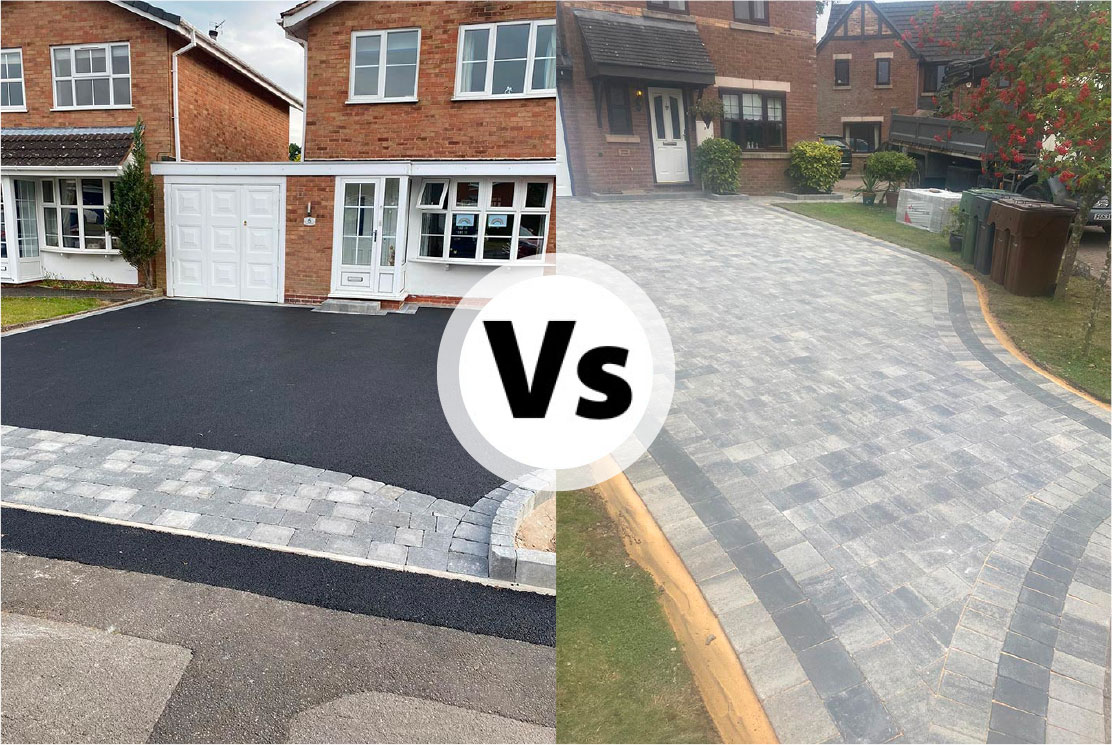A driveway is often the first thing people notice about your property. It frames your home, adds to its kerb appeal, and provides practical benefits like parking and access. In the UK, two of the most popular driveway materials are block paving vs tarmac. Both options have their strengths, but which one is right for your home?
At RDFinishersNW, we’ve worked on countless driveways across the UK, and we know homeowners often struggle to decide between these two. In this guide, we’ll compare block paving and tarmac in terms of cost, durability, aesthetics, maintenance, and environmental impact—helping you make the best choice for your property.
What is Block Paving?
Block paving involves laying bricks or blocks in patterns to create a hard surface. The blocks come in a wide range of shapes, colours, and finishes, making it one of the most versatile driveway options available.
UK homeowners love block paving because it:
- Adds a premium, stylish look to the home.
- Can be laid in different patterns (herringbone, stretcher bond, basketweave).
- Allows damaged blocks to be replaced individually, reducing repair costs.
It’s a favourite for those who want a durable driveway with character and customisation.
What is Tarmac?
Tarmac, also known as tarmacadam, is a mixture of tar and crushed stone. It creates a smooth, uniform black surface, commonly used for roads, car parks, and driveways.
The appeal of tarmac for UK homes lies in:
- Quick installation – it sets faster than block paving.
- Lower upfront cost compared to most paving options.
- Neat appearance that looks modern and professional.
While it doesn’t offer the same design flexibility as block paving, tarmac is practical, cost-effective, and suits homeowners who prioritise function over style.
Block Paving vs. Tarmac – Key Comparison Factors
Cost
- Block Paving: More expensive, averaging £80–£120 per m² in the UK.
- Tarmac: More affordable, around £40–£70 per m².
If you’re on a budget, tarmac is the cheaper option upfront. But block paving often adds more long-term value to your home.
Durability & Lifespan
- Block Paving: Can last decades if properly installed and maintained. Individual blocks can be replaced if damaged.
- Tarmac: Durable but more prone to cracking under heavy loads and extreme weather. Typically lasts 15–20 years before resurfacing is needed.
Block paving usually wins on lifespan, especially for long-term homeowners.
Aesthetic Appeal
- Block Paving: Highly customisable with colours, finishes, and patterns. Adds a premium, stylish finish to homes.
- Tarmac: Limited design options—usually plain black, although coloured tarmac is available at higher cost.
For kerb appeal, block paving is the clear winner.
Maintenance & Repairs
- Block Paving: Weeds and moss can grow between joints, requiring regular cleaning and sealing. Repairs are simple—just replace damaged blocks.
- Tarmac: Generally low maintenance. However, cracks and potholes require professional repairs and can spread quickly.
Tarmac needs less day-to-day care, but block paving is easier to repair in sections.
Drainage & Environmental Impact
- Block Paving: Available in permeable designs that meet UK Sustainable Drainage Systems (SuDS) regulations. Helps reduce flood risks.
- Tarmac: Non-permeable unless using porous tarmac, which is more expensive.
Environmentally, block paving is the better choice.
Which is More Suitable for UK Homes?
Choosing between block paving vs tarmac depends on your priorities:
- Choose Block Paving if:
- You want a stylish driveway that boosts property value.
- You don’t mind a higher upfront cost for long-term durability.
- You like customisation and patterns.
- Choose Tarmac if:
- You’re on a tight budget.
- You need a driveway installed quickly.
- You prefer a simple, low-maintenance surface.
Cost Breakdown in the UK (2025 Estimates)
- Block Paving Driveways: £80–£120 per m².
- Tarmac Driveways: £40–£70 per m².
- Factors Influencing Price: driveway size, location, base preparation, and any extras (edging, drainage, sealing).
At RDFinishersNW, we always provide transparent, tailored quotes so you know exactly what you’re paying for.
Conclusion:
Both block paving and tarmac are excellent choices for UK driveways, but the right option depends on your budget, style preferences, and how long you plan to stay in your home.
- Block paving offers beauty, durability, and long-term value.
- Tarmac provides a budget-friendly, quick, and simple solution.
If you’re unsure which is right for you, our team at RDFinishersNW is here to help. With years of experience installing both block paving and tarmac driveways across the UK, we’ll guide you to the best choice for your home.
FAQs
Which lasts longer, block paving or tarmac?
Block paving usually outlasts tarmac, especially since individual blocks can be replaced. Tarmac typically needs resurfacing after 15–20 years.
Is block paving worth the extra cost?
Yes. While it costs more upfront, block paving adds kerb appeal and property value, making it a worthwhile long-term investment.
Can I install block paving or tarmac myself?
DIY is possible but not recommended. Professional installation ensures correct drainage, durability, and compliance with UK regulations.
Which driveway needs less maintenance?
Tarmac requires less daily upkeep, but once damaged, it’s harder to repair. Block paving needs cleaning and sealing but allows for easy spot repairs.
What’s the most eco-friendly driveway option?
Permeable block paving is the more eco-friendly option, as it supports drainage and reduces flood risks in UK areas prone to heavy rain

